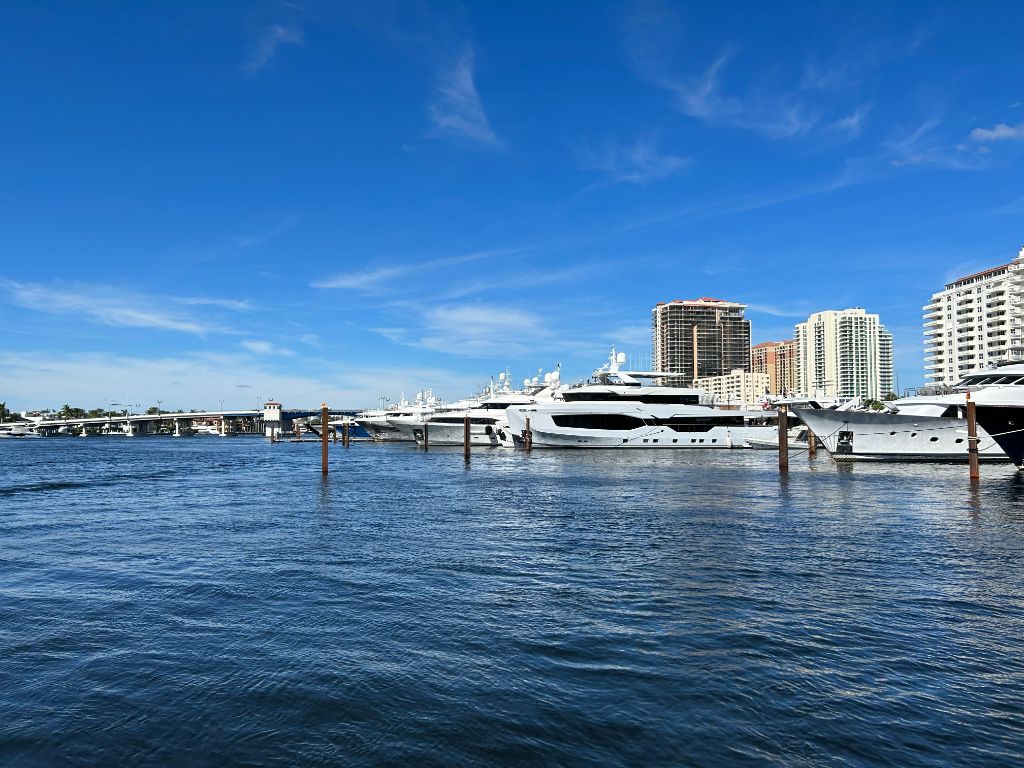
From the topics that get addressed in its panels to the ways attendees get moved around the sites, FLIBS 2023 prides itself on an innovative, forward-thinking ethos.
The people at Water Taxi aren’t exactly intimidated by big numbers. After all, the ubiquitous yellow boats ferry about 1.1 million people around the Fort Lauderdale area’s waterways every year.
But during the Fort Lauderdale International Boat Show, which opens Wednesday and runs through Sunday, even big numbers get dwarfed. When the Water Taxi stops its normal routes to take up its temporary role as official FLIBS on-water transport, they get about 90,000 boardings in five days. That’s more than six times their average traffic.
“We charter in five boats to help us, we shut down our whole Water Taxi system,” president and CEO Bill Walker said. They also bring in an additional 18 to 20 people to help with various shoreside roles.
“It’s one of the things that my company and my staff get really excited about – me too,” Walker said. “They really step up to the challenge, these vast movements of people.”
At FLIBS, big numbers get thrown around fairly regularly. From a local perspective, one of the biggest numbers of the show is the more than $1.79 billion that organizers say it pumps into the state economy. From an industry standpoint, the big numbers are visible from any dock. But organizers hope attendees look beyond the sheer number of vessels to the increasingly diverse programming and other events the show has planned.
This year’s FLIBS includes the Winward VIP Club as well as more than 100 other food concessions and bars throughout the show’s handful of locations. The Broward County Convention Center hosts the AquaZone and the Kids’ Corner; the former showcases innovative marine and watersports products, while the latter gives an all-ages experience that includes everything from kids’ fishing clinics to ocean arts and crafts.
Then there’s the various programs, talks and seminars. One of the big ones happens on the show’s first day. FLIBS has partnered with the Marine Research Hub to create the MRH Innovation and Sustainability award. It’s an initiative that has its roots in the Marine Industry Association of South Florida, which owns the show. Informa Markets produces the show.
“We started the Marine Research Hub back in 2017,” MIASF CEO and president Phil Purcell said. “It’s its own freestanding not-for-profit.” It partners with South Florida’s major universities and exists to create a kind of ocean version of Silicon Valley. It’s all about monetizing the blue economy. And at the show, that’s all about getting interesting marine-based companies and their ideas in front of a world that includes angel investors and others who can make it happen. This year, judges including Philippe Cousteau will pick the winner, then memorialize it with an award.
“That’s a big deal; it’s the first ever,” Purcell said. “The Marine Research Hub is the one that came up with the idea; Informa backed it right away.”
He cites other parts of the schedule – a global business event, the annual Ocean Exchange innovation and technology event – that make FLIBS a place for ideas as much as yachts.
For Bill Walker, there’s also innovation involved in getting this many people where they need to go. No other yacht show in the world has this, he said. Depending on where you’re staying, it’s possible to get not only around FLIBS but back to your hotel for lunch, then back for an afternoon session, all via water. For people staying farther afield, he notes that they’re now partnering with Brightline, Florida’s fairly new rail service. It takes people overland from its downtown train station to the Riverside Hotel on the New River, where the Water Taxi is waiting.
Sustainability isn’t just something talked about in panels at FLIBS. It’s also present in those transportation choices.
“One our our big things as a company is working on sustainability,” Walker said. “All our vessels have (cleaner) tier-3 engines except one, and that one’s getting a new engine right after the boat show.” (There have been supply chain issues, he said.
“One of the staggering thing is – if you take the 90,000 people, I think we burn .002 gallons per person,” he said. “And the number of cars we’re taking off the road is substantial.”
Plus, like so much at FLIBS, it’s frankly just quite cool.
“The enjoyment of going to the world’s largest boat show on the water,” he says, “is a real wow factor.”
Be sure to check in with Triton every day during FLIBS – and if you’re at the show, pick up a copy of our Triton Daily!
Tagged FLIBS 2024, Marine Research Hub, Water Taxi
Topics:
